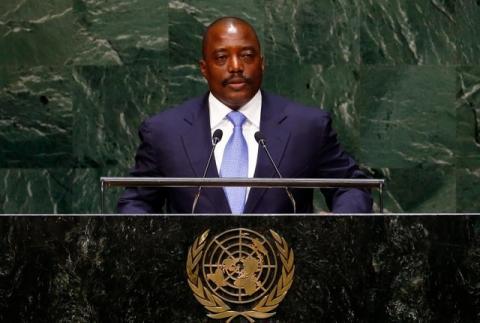Advertisement
U.S. says political crisis building in Democratic Republic of Congo
WASHINGTON (Reuters) - A political crisis is growing in Democratic Republic of Congo over the possibility that President Joseph Kabila might seek a third term in office, a senior U.S. official warned on Wednesday.
Tom Perriello, U.S. Special Envoy to Africa's Great Lakes Region, said if Kabila sought a third term in November elections, even though the constitution bars such a move, it could undermine political and economic gains of the past decade.
Kabila has stopped short of saying he will step down in November at the end of his second elected mandate, prompting concerns he wants another term.
"A political crisis is building as the DRC prepares, or rather fails to prepare, for upcoming historic elections scheduled for this November," Perriello told a congressional hearing. "If the DRC chooses the path of Burundi, the scale of human suffering could dwarf what we have seen next door."
More than 240,000 people have fled political violence in Burundi, sparked by President Pierre Nkurunziza's decision last year to run for a third term. It has raised concerns of a bloody ethnic conflict in a region where memories of Rwanda's 1994 genocide are still fresh.
Perriello said it appeared increasingly possible that Kabila was seeking reelection, pointing at delays by his administration to prepare for the elections.
"A confrontation between President Kabila and those demanding timely and credible elections in the country is not inevitable, but it is becoming increasingly probable," he said.
RWANDAN MEDDLING
Perriello and Linda Thomas-Greenfield, U.S. assistant secretary of African Affairs, also raised concerns over reports that Rwanda's government was meddling in Burundi's conflict.
"We have seen a number of reports from our colleagues in the field that suggest the Rwandan government has been involved in destabilizing activities in Burundi," Thomas-Greenfield said.
"We have raised these concerns with the Rwandan government and encouraged them to play a productive role and not to do anything that might further destabilize Burundi."
Perriello said there were "credible reports" that Burundi refugees, including children, were being recruited from camps in Rwanda to fight on behalf of the Burundian opposition.
Burundi and Rwanda have the same ethnic mix, about 85 percent Hutus and 15 percent Tutsis. A 12-year civil war in Burundi, which ended in 2005, pitted a Tutsi-led army against Hutu rebel groups. The United States is Rwanda's largest national donor.
Reuters revealed a confidential report to the U.N. Security Council on Feb. 3 which accused Rwanda of recruiting and training Burundian refugees with the goal of ousting Nkurunziza.
(Reporting by Lesley Wroughton; Editing by Mohammad Zargham and Andrew Hay)



















Add new comment